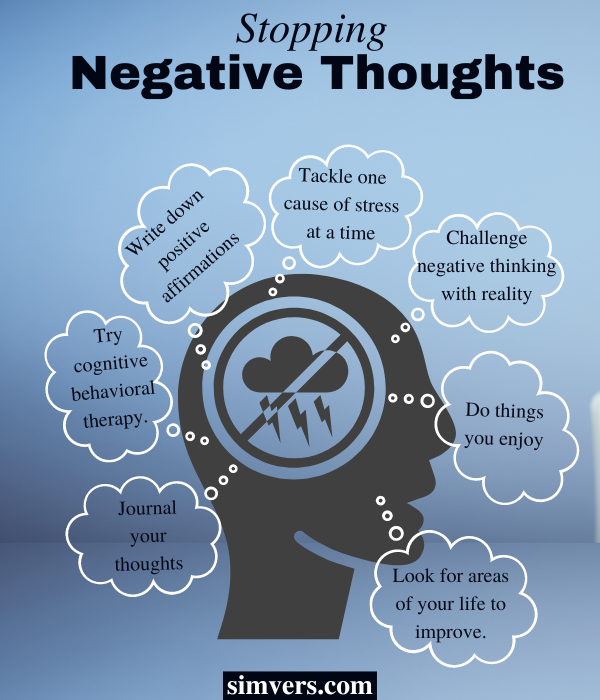
According to research, around 80% of our daily thoughts are negative. This doesn’t mean that you’re a pessimist; it just means that most of what goes through your mind each day is negative. This can cause stress, anxiety, and low moods, which in turn can have a detrimental effect on our lives.
You have to take control of your ideas and end the negative spiral you’re in by changing how you think about things.
There is got to be a way to prevent this from happening, right? What can we do to control our negative thoughts and deal with anxiety? There are many ways to stop your negative thoughts, and this article will cover the most effective ones. Let’s go
What are the reasons for negative thoughts?
Several factors can cause negative thoughts. These include:
Anxiety About the Present
You may have anxiety about the present and what is happening in your life. You may be worried about work, family, or other issues. Negative ideas can creep into your head when you are feeling anxious or stressed out about something that is happening in your life.
Shame on Any Past Happening
Shame can be a major reason for negative thoughts. You may feel ashamed about something that happened in your past, which can impact your feelings.
Fear of the Coming Future
The future is something that we cannot control. We can only hope certain things will happen and try to prepare for them. However, we cannot predict many things, which can cause fear in some people. If you have anxiety about the future, then this can lead to negative thoughts entering your head.
How to Recognize Your Negative Thoughts
Recognizing the different categories of negative thoughts is an essential first step. Once you know what kind of thoughts you have, it becomes easier to challenge them and replace them with more positive ones.
The categories of negative thoughts are:
Catastrophising
Catastrophising means you expect the worst to happen. You may feel that something terrible is bound to happen or predict the worst possible outcome.
It’s common to worry, “What if I fail?” before a big test. This line of thinking can only serve to heighten your already present anxiety and sense of unpredictability.
Magnification/minimisation
You might feel that something is all good or all bad, which can lead to negative thoughts about yourself, others, or the world. For example, when you have a bad day at work, it’s easy to think, “I’m useless at my job.”
This thought makes it more difficult for you to enjoy the things that are going well in your life.
Black-and-white thinking
This all-or-nothing thinking makes you feel things are either perfect or terrible. It’s easy to get caught up in black-and-white thinking when you feel anxious, making it difficult to see shades of grey (or reality).
If you’re having a poor day at work, for instance, it might seem like nothing went right and that everything is hopeless.
Shoulds and musts
Do you tell yourself that you should have done certain things at certain times? For example, “I should have a good job by now” or “I should be married with kids by this age.”
Shoulds and musts can make you feel like a failure if you don’t meet your unrealistic expectations, making you even more anxious.
Emotional reasoning
Our emotions are super powerful, but they can also be misleading. For example, feeling anxious about something that hasn’t even happened yet can make it feel like a bad thing is inevitable and will occur.
If this happens, it might seem like there is no point in trying to avoid or prevent the bad thing from happening because it will happen anyway.
MORE:
- Can People With Tattoos Go To Heaven?
- What Is Grace
- What is Guided Meditation
- Jehovah Jireh Meaning In Hebrew Bible
- What is Lokai Bracelet?
How to Stop Having Negative Thoughts
If you find that you have negative thoughts, it can help to try these techniques:

Journal your thoughts
Sometimes writing things down can help you better understand your thoughts. This can make it easier for you to notice when your thoughts are negative and help you figure out why they are so negative in the first place.
You could try keeping a thought journal or diary where you write down what happened in your day and how you felt about each event. Try not to judge or criticize yourself when writing these things down, as that might make you feel worse.
Tackle one cause of stress at a time
Yes, life can be stressful, but you shouldn’t try to fix everything at once. If you have many things causing stress in your life, focus on one thing at a time.
For example, if an important presentation at work stresses you out, don’t worry that your partner is away for a couple of weeks. Instead, work on reducing your anxiety before the presentation and tackle other causes of stress afterward.
Try cognitive behavioral therapy.
Cognitive behavioral therapy helps people learn to live with and control their stress. Participating in therapy entails consulting with a therapist who will evaluate your current state of affairs and provide recommendations for improving your quality of life.
One of the main aims of this therapy is to identify and change any unhelpful thoughts or behaviors that might be causing your stress.
Write down positive affirmations about yourself.
Affirmations are among the best ways to reduce anxiety and stress. When you write down positive affirmations about yourself or say them out loud, they help to create a positive outlook on life by changing your mindset.
This will significantly impact how you feel about yourself and your world.
Challenge negative thinking with reality
The next stage in relieving stress and anxiety is to become aware of the specific thoughts that are contributing to the problem.
For instance, if you think, “I always mess up in interviews,” try to challenge this thought by thinking through your past interview experiences and how they turned out.
If you were successful, write down why this was so; if not, think about what could have made a difference and how you can apply these lessons next time.
Nurture yourself and do things you enjoy
Do you take part in a pastime that you find enjoyable? If not, It’s time to find one. In such a case, It’s time to start looking for one, Exercising, which causes the production of feel-good hormone endorphins, is one of the most effective strategies to alleviate stress and anxiety.
So, go for a walk, take up running or swimming, or even go for a bike ride every day—the benefits are excellent!
Look for areas of your life to improve.
Negativity comes from a lack of satisfaction with life, and one of the best ways to improve that is by taking an honest look at yourself and your situation. If you find areas of your life you want to improve, do so!
Look for things you can change in your routines or habits; perhaps it’s time to start eating healthier, exercising more frequently, or even making more time for loved ones.
Conclusion
Negative thoughts are the enemy of happiness and can lead to depression if left unchecked. By learning to recognize negative thoughts, challenging them when they occur, and replacing them with positive ones, you’ll be able to keep negativity at bay!
MORE:
- Affirmations for Self-Love
- Seven Deadly Sins
- Positive Affirmations
- What Happens Before & After You Die
- What Is A Mantra
